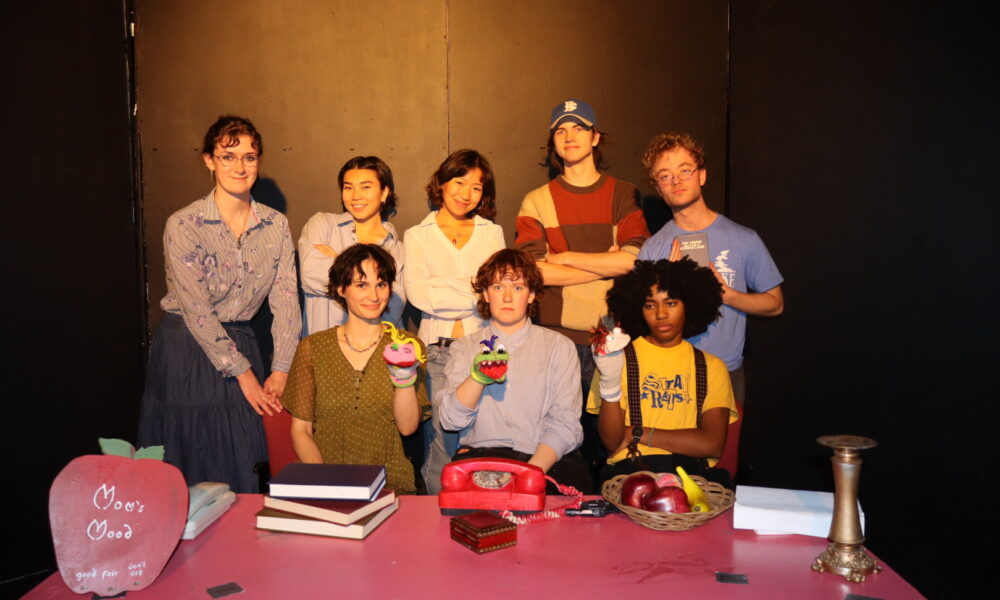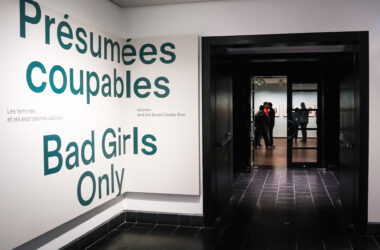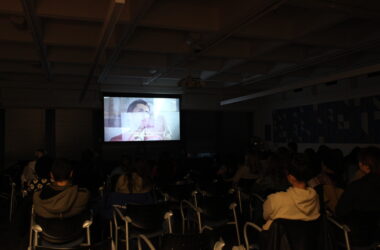Walking out of Players’ Theatre on Tuesday, Nov. 26 after the inaugural showing of Hand to God, it would be hard to miss the floored yet delighted reactions of audience members. The phrase “fucking badonkers” echoes off the high ceilings of the University Centre—and quite frankly, it’s a fairly apt description. Jam-packed with satanic puppets, missing earlobes, and a whole lot of deep-cut religious humour, Hand to God is one of the more entertaining ways to spend a Tuesday night.
The play, written by Robert Askins, is set in the devoutly religious town of Cypress, Texas and follows recent widow Margery (Claire Tees, U4 Arts) as she attempts to lead a puppet club at the local church. The project was given to her by Pastor Greg (Henry Kemeny-Wodlinger, U2 Arts) in order to keep her occupied (idle hands and such) after the death of her husband. The club’s teenage members include her son Jason (Elias Luz, U0), his girl-next-door crush Jessica (Raphaëlle Béhar, U2 Arts) and his bully/rival Timmy (Nia Blankson, U4 Music). Things take a dark turn when Jason’s hand puppet, Tyrone, springs to life, declaring himself to be Satan, luring the group into sinful behaviour and spilling secrets everyone would prefer to keep hidden.
The show’s strength lies in its ensemble’s electric performances, particularly Luz, who commands the stage in a dual role as Jason and Tyrone. His rapid-fire transitions between Jason’s shy, childlike voice, and Tyrone’s husky, demonic growl feel like a marvel of athleticism and timing—a Jekyll and Hyde transformation for a boy and his puppet. The cast’s impeccable Southern accents amplify Tyrone’s menacing presence, grounding the play in its Texas setting. For co-director Roberta Du (U3 Arts and Science), this attention to detail was a happy surprise.
“[The majority of the cast] ended up in the same callback, and we just put them in the roles that they are in now. And we were like, this is the show,” Du told The Tribune. “We didn’t have our hopes up for the Southern accent. We were like, if it’s bad, we’re not going to do it, but they were all, like, really dedicated. And that also kind of goes to show the type of people we want—super passionate, working for this play along with their talents.”
The passion shows not only in the performances but in the play’s immersive design. Audience members were greeted by a “Blood Splash Zone” warning upon entering the theatre—a mildly disturbing omen for what’s supposed to be a church puppet show. The reason became clear during several gleefully grotesque scenes involving stabbings, strangulations, and mutilations—mostly performed by Tyrone the puppet. The blood effects, impressively realistic, were a labour of love.
“Originally, we weren’t actually going to do blood. We were going to do, like, a comedic bit of red string coming out or something. But then we thought, it would look better. Making the blood sacks was actually really difficult. It took me a long time to figure out what we were going to do because we searched up ‘pouches of blood to explode,’ and they did not exist. So we made them out of plastic bags and hair elastics,” Co-Director Alexis Mezzarobba (U3 Science) explained.
Despite their limited experience as directors, Mezzarobba and Du’s collaboration brought a cohesive vision to the production. Together, they crafted a tone that shifts seamlessly from absurd comedy to chilling chaos, delivering a show that feels like a slow descent into madness.
“[I] think we knew we were gonna work well together, but we didn’t know just how well. It really felt like two brains working as one. Anything that I couldn’t quite remember, I feel like was […] filled in by [Mezzarobba],” Du told The Tribune.
Hand to God is incredibly successful in its cutting religious sarcasm and pushing unnerving violence to boundaries in all the right ways.
In the best way possible, it will haunt my dreams (or maybe nightmares) forever.
Arts & Entertainment Editor Dana Prather was the Intimacy Director for ‘Hand to God’ and was not involved in the editing or publication of this article. Web Editor Roberta Du was the Co-Director of this project. While interviewed, she was not involved in the editing or publication of this article.









